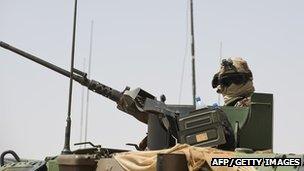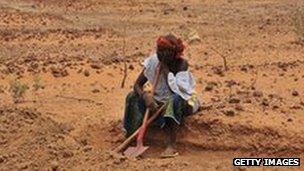Aid groups fear impact of US austerity budget
- Published

The US budget cuts trim programmes at home and abroad
The US Congress has slashed $85bn (£56bn) from the federal budget through the end of September. Now, foreign aid groups that rely on US support fear the cuts will devastate the people in the most desperate need.
When Jeremy Konyndyk, director of policy for Mercy Corps, talks about budget cuts in the US, he barely mentions the impact the reductions will have on Americans.
Instead, he worries about people overseas - such as those he met recently in Niger.
In January, Konyndyk visited a village in the county's Ouallam region, roughly 62 miles (100km) from Niamey, where he met a group of about 20 women who had received a goat through a food-security programme.

US funds are helping tamp down violence in Mali, where French troops have beat back Islamist rebels
"This programme at least gives them some prospects for getting through the drought without getting totally wiped out," he says. The budget cuts, he says, will make it harder to help those and other women in Niger.
The US Congress has slashed $85bn from US spending for this fiscal year, which ends in October. The deficit reduction measures are referred to in Washington DC jargon as sequestration.
In Washington, White House officials say the cuts will affect everything from White House tours (cancelled) to domestic airline flights (delayed). Despite those claims, though, some of the cuts to the budget will barely be felt.
"It's not the end of the world," says Gordon Adams, an American University professor who was a senior budget official in the Clinton White House. "It's a haircut."
But the cuts affect not only Americans - people around the world will see its impact.
European officials may spend less time in meetings, for example, because their counterparts in Washington will be making fewer overseas trips. Some Pentagon officials have already cancelled trips to Europe this spring.
But for people living in other parts of the world, the impact could be more significant.
The US is the world's largest provider of humanitarian aid, according to the London-based Overseas Development Institute. The US also offers military assistance to countries in the Middle East and other regions and funds programmes for global health, refugee aid and more.
The March law writing the cuts into the budget slashed funding for these and other programmes by roughly 5%.
More than $2.7bn will be taken from state department foreign operations and other programmes, according to the Congressional Research Service.
In some cases the cuts will affect government institutions in other countries. Aid to countries such as Egypt (the US provides roughly $1.3bn annually to its military) and Israel (roughly $3bn annually) also may be reduced.
The budgetary reductions will have an impact on individuals, say aid workers, since the cuts will be applied to programmes already stretched thin.
Contributions to international peacekeeping, which helps to tamp down on violence in conflict-ridden countries such as Mali, will be reduced by $20m.
And funds for humanitarian programmes, which help families in the Horn of Africa and other places in crisis, will be cut by roughly $200m, state department spokeswoman Victoria Nuland has said.
Efforts to fight disease in Africa may also be affected, since global health programmes will lose more than $400m in US funding.
"We work on programmes for the most needy people on the planet," says Tom Hart, US executive director for the ONE Campaign, the advocacy group founded by U2's Bono.
"These people are living on the edge. About a million kids won't be vaccinated. A million bed nets that prevent malaria won't be distributed."

Communities in Niger receive US assistance for agricultural programmes
Hart and other advocates fear the lives of many people overseas will become harder if aid programmes, which include food security and agricultural projects, are reduced.
And many humanitarian aid workers say their programmes are already financially strapped.
"At this point, we are facing an acute number of crises," says Jeremy Kadden, a senior legislative manager at InterAction, a consortium of non-governmental organisations based in the US. "We have more people in need than ever before."
Konyndyk of Mercy Corps says the budget cuts chip away at efforts to help people in other parts of the world and put Americans in a bind.
"The government is faced with a kind of Sophie's choice," he says. "Which disaster do you save?"